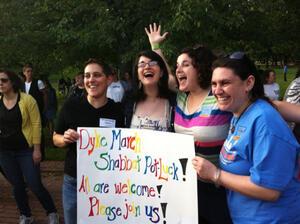Claiming our Inheritance at the Boston Dyke March
Orginally posted on Queer Interfaith Community on June 17th, 2011.
v’shabat kad’sh’kha b’ahavah uv’ratzon hin’chal’tanu
Barukh atah Hashem, m’kadeish hashabat
With love and desire you have given us your sanctified Shabbat as an inheritance.
Blessed are you, Gd, who sanctifies Shabbat.
In the Babylonian Talmud Tractate Pesachim there is a series of discussions about Shabbat, its entrance and exit, and the role of people in marking those transitions. In one particular story, a group of friends are sitting around eating a late lunch on a Friday afternoon and they ask an elder to go outside and see if Shabbat has become holy so that they can stop their meal and designate it for Shabbat. The elder responds to their request saying that “there is no need.” In the context of the Talmudic passage it is unclear what is not needed, though possibilities include: pausing their meal to designate it for Shabbat, sanctifying Shabbat at all, or going outside to see if Shabbat has begun yet. Regardless, the statement “there is no need” is a strong one that reveals the privilege of this particular group of friends. They are, of course, rabbis of the Talmud. The question at hand, the role of people in sanctifying Shabbat, rests on the assumption that this group already has a relationship with Shabbat and with the Jewish law that governs the way they interact with her. Regardless of what they need to do or do not need to do it is clear that Gd’s holy Shabbat is a part of their inheritance.
As a member of the GLBTQ community and a rabbinical student, it is clear to me that the words “there is no need” do not apply to places where Jewish and Queer communities intersect. There is so much need. Before these needs can be addressed, they need to be made visible. GLBTQ Jews need to be seen as vital members of our GLBTQ communities. We need to be seen and valued as Jews who have vast interests and abilities and life experiences that can, and already do, enrich Jewish life. We, GLBTQ Jews, also need to stand up and claim Jewish community, Jewish tradition, and Jewish law for ourselves.
A few weeks ago, I promised a friend that I would provide dinner for her in the event that she was volunteering for the Boston Dyke March. Being the rabbinical student and committed Jew that I am I suggested that, since it was a Friday night, challah and grape juice would be in order. I figured we could get four or five friends together for a pre-March dinner. A second friend jumped on the idea, set up a facebook invite, and got an organizing team together. Harnessing the power of collective enthusiasm, twitter, and facebook, there we were on Friday night. We stood in a circle, huddling in close to be heard over the music of Zili Misik coming from the stage, small cups of Manischewitz in our hands. I recited Kiddush, we sang the last lines together, claiming Shabbat as our inheritance. Loaves of challah were uncovered. We reminded each other of those in the world without food, and the members of the GLBTQ communities in places where it is not safe to stand up and be seen. We thanked Gd for the food and privilege we were so blessed to enjoy in that moment and dug in to one of the best potluck dinners I have participated in all year. It was exactly how I had pictured it; only there weren’t just five of us, there were twenty-five.
v’shabat kad’sh’kha b’ahavah uv’ratzon hin’chal’tanu
These are the words that are still ringing in my head. With love and desire you have given us your sanctified Shabbat as an inheritance. To us. With love! With desire! To us!
I stood standing in the center of a circle of GLBTQ Jews and our allies, closed my eyes, and heard their voices joining mine in acknowledging and accepting Gd’s gift to us. The sounds of Zili Misik faded and my voice rose: “Barukh atah Hashem, m’kadeish hashabat.” The word “amen” has never felt more affirming. In that moment I was being seen in a way I had never been seen before – I was me, Becky – Queer, Jewish, Rabbinical Student. And I saw those around me as I had never seen them – Queer and Jewish and my community.
The earlier statement that “there is no need” is reliant upon the assumption that the rabbis had a relationship with Shabbat, with Judaism, with Gd. After experiencing Shabbat Potluck at the Boston Dyke March, I can say without hesitation, “relationship established.” I am ready to move beyond that basic assumption, and I’m pretty sure that the Queer Jews who stood around me are ready to move beyond that assumption as well. This is my calling – to push myself, the Jewish community, and the Queer Jewish community to simultaneously continue to build a platform of visibility and to move forward from it. I can no longer wait to ask the questions, the deeper questions, and to engage others in them. They are questions that both call to me as a matter of moral imperative and enliven my soul.
The Kiddush recited on festival evenings that coincide with Shabbat ends with the following blessing: Barukh atah Hashem, m’kadeish hashabat v’Yisrael v’hazmanim. Blessed are you, Gd, who sanctifies Shabbat, Israel, and the festival times. It would certainly be a radical move, and one that I’m not ready to make, to consider the Dyke March a festival. And yet, last Friday night I felt as though I, those around me, and the Dyke March were all engaged in the work of bringing Gd’s presence more deeply into our world.
Since 2011 the Shabbat Potluck at the Dyke March has become a yearly tradition. RSVP on facebook to attend this Friday, June 7.






